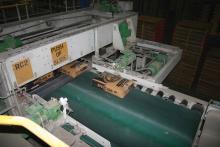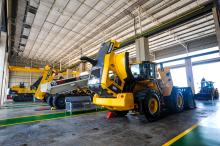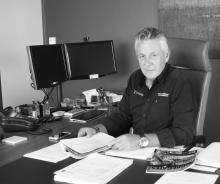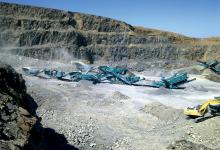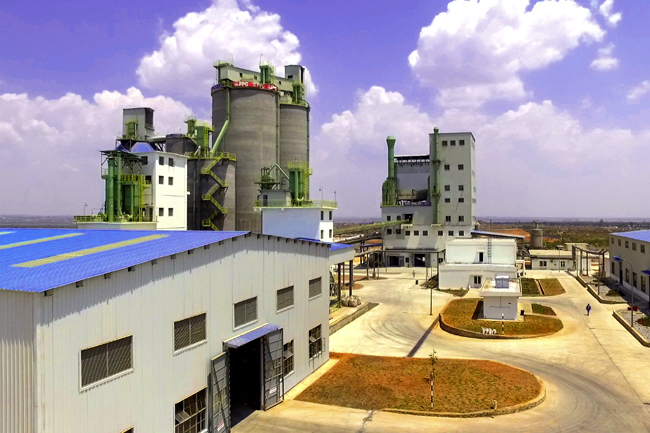
In February 2016, Kelibone Masiyane assumed overall responsibility of PPC Zimbabwe’s business. His immediate focus was to ensure that the company’s US$85million Harare cement plant project – a key part of PPC’s strategy to offer Zimbabwe ‘strength beyond’ – would be commissioned on time and within budget later that year. Munesu Shoko reports.
Over the past few years, PPC, a giant in the African cement industry, has embarked on an African expansion programme to grow revenue outside South Africa and have a diversified portfolio. As part of that expansion revolution, the US$85million, 700,000-tonne per year Harare cement milling plant was commissioned by year-end 2016. The plant brought
By far the biggest capital project in the history of PPC Zimbabwe, the new Harare plant represented PPC’s vote of confidence in the future of Zimbabwe, a country that has experienced persistent economic turmoil over the past two decades. For a project of this nature, cost overruns during its construction were out of the question, and managerial stability was key to its completion on time and within budget. When previous MD Njombo Lekula was redeployed to become MD of PPC’s international operations, Kelibone Masiyane took the reins as the new MD of PPC Zimbabwe.
Masiyane was the right choice to succeed Lekula for many reasons; apart from boasting strong institutional knowledge, having been part of the PPC Zimbabwe set-up for the past 24 years, he also possesses both considerable operational and strategic leadership qualities acquired through his several roles within the company over the past two decades.
“I have worked for PPC for the past 24 years, having started as an instrumentation attachment student in the electrical department back in 1993,” explains Masiyane. “It was coincidental that during the same year PPC commissioned its modernised clinker plant in Colleen Bawn.”
After a brief stint where he was responsible for stacking and blending plant projects, in 2003 Masiyane moved to the production department as production superintendent. He became production manager shortly afterwards. “This gave me a solid foundation in key production areas from a plant perspective,” he says.
In 2009, he was promoted to general manager of the Colleen Bawn plant, a role he held until becoming managing director of PPC Zimbabwe in February 2016. Masiyane took over at a time when PPC was already moving towards the commissioning of the Harare plant, and the project became his primary focus. “It has always been my belief that one should never change a winning strategy,” he says, referring to his approach when he took over.
He went on to oversee the successful commissioning of the Harare plant in November 2016, on time and under budget. The plant is an ultra-modern facility that boasts a cement ball mill with a dynamic separator; a single line packer, palletiser stretch hood and storage warehouse; road and rail offloading facilities; and a bulk bag loading facility, among other modern features.
The Harare plant is designed to produce 700,000 tonnes per annum. Capacity utilisation is currently above 50% and continues to grow steadily. The PPC Colleen Bawn plant produces sufficient clinker for the company to produce 1 million tonnes of cement per annum. The total grinding capacity of both the new Harare and the Bulawayo factories is about 1.4 million tonnes per year, both of them operating at similar capacity levels.
Current cement consumption capacity in Zimbabwe is estimated to be around 1.3 million tonnes per year, which is way below the country’s installed capacity. Apart from PPC Zimbabwe, the southern African country’s cement industry comprises four other key players - Sino-Zim, Lafarge Zimbabwe, Livetouch and Peckstar.
Despite the slow economic activity, which has resulted in low cement consumption, PPC Zimbabwe’s investment in a new plant was informed by the company’s long-term growth strategy. The market might be depressed at the moment, but the Harare plant investment is strategic for PPC.
“Our approach is driven by our mantra to offer Zimbabwe ‘strength beyond’, as a reliable partner that supports the country’s economic recovery, including through building the necessary economic infrastructure,” Masiyane says. “From the onset, we were well aware that the ramp-up in volumes at the Harare plant was always going to be difficult, especially in a challenging economic environment. However, with the added benefit of our increased footprint, the Harare plant has played a significant role in reducing our cost to serve the customer.”
Having operated factories in the southern region of the country for many years, Masiyane says the intention of investing in the Harare plant was to provide products and services across the whole of Zimbabwe and ensure that the country has adequate premier quality cement for all its construction needs. “The Harare factory has ensured that the people of Zimbabwe, particularly those in the northern parts, have access to a quality product to construct buildings/structures that will last them for many generations,” he says.
“The north has always experienced greater infrastructural growth compared with the south and the location of the Harare plant will unlock significant value as Zimbabwe recovers from its prolonged economic downturn.”
The Harare plant also extends PPC Zimbabwe’s reach into other regional economies. “The addition of the Harare factory to the company’s Colleen Bawn mining and Bulawayo factory operations means that PPC will not only be able to meet demand in Zimbabwe’s economic hub, but it also boosts the country’s exports to other regional markets, including Malawi, Zambia and Mozambique,” says Masiyane.
Despite the protracted economic turmoil in Zimbabwe, there is a general positive sentiment in the country, especially following a new political era that saw the end of Robert Mugabe’s 37-year rule in November 2017. Developments in the political landscape provide signs of renewal and several infrastructure projects are in the pipeline that are expected to increase cement consumption in the country. In recent months, infrastructure stakeholders from around the world have shown keen interest in Zimbabwe amid a new spirit of optimism in the country.
According to research and consulting company Africa House, which has led two recent fact-finding and business development delegations to Zimbabwe, the prevailing spirit in Zimbabwe has changed dramatically over the past few months. The country’s public and private sectors are more positive than they have been in possibly 15 years, but with a sense of realism. Significant infrastructure and industrial revitalisation projects are planned, but there are still certain challenges in the way of realising them.
Masiyane shares the same cautious optimism. “We remain optimistic on the back of positive and progressive pronouncements made by the new government,” he says. “PPC, with the recent construction of the Harare plant, is more than capable of supplying all the cement requirements that the country may have.
“Prospects for activation of numerous infrastructure projects, including Gwaai-Shangani dam, Hwange Thermal Power Station and the Harare Airport expansion, are now high and these should move the construction market into high gear.”
Commenting on the medium to long-term prospects for PPC’s business in the country, Masiyane says: “The Zimbabwean government is projecting a 4% GDP growth rate this year, while some economic commentators are forecasting a 1% GDP growth. Cotton and tobacco harvests are expected to continue to contribute significantly to revenue inflows. On the back of all this, PPC remains well-positioned for the expected economic upturn and infrastructural developments and investments.”


